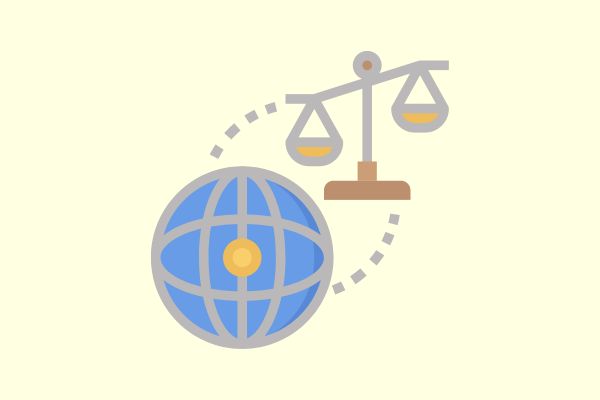Legal Reasoning Questions for CLAT | QB Set 22

Theme: International law + legal current affairs
The Kerala High Court recently quashed criminal proceedings against an Australian tourist of Jewish descent, Zara Michele Shilansk, who had been charged by the Fort Kochi police for tearing down posters related to the Israel-Palestine conflict. The Court, presided by Justice Bechu Kurian Thomas, observed that the posters had been put up without legal authorization, thus making their removal by the tourist not an illegal act. However, the Court noted that it would have been preferable for the tourist to report the issue to the appropriate authorities rather than removing the posters herself.
The tourist had encountered two posters in Fort Kochi with the slogan “Silence is Violence, Stand up for humanity.” Disturbed by their message, she and her friend initially attempted to have the posters removed through the local tourism office. When their efforts failed, they decided to tear the posters down. Following this, a complaint was lodged against her by the Area Secretary of the Students Islamic Organization (a student wing of the Jamaat-e-Islami), resulting in a criminal case under Section 153 of the Indian Penal Code (IPC). Section 153 penalises acts done with intent to provoke a riot.
Justice Thomas concluded that tearing down posters put up without legal authority did not meet the criteria of an illegal act under Section 153 IPC, as the main ingredient of provoking rioting was absent. The Court further observed that the final report did not contain allegations that the tourist’s actions were intended to incite or provoke a riot. Consequently, the Court quashed the criminal proceedings against her. This decision brought relief to the tourist, who had been detained at the airport due to a lookout notice.
Question 1:
An Australian tourist in Kerala tears down posters related to the Israel-Palestine conflict, which were put up without legal authority. She and her friend tried to get the posters removed through the tourism office but, when unsuccessful, removed them themselves. Can her actions be considered illegal under Section 153 IPC?
a) Yes, because tearing down any posters in public is illegal.
b) No, because the posters were put up without legal authority, and removing them did not provoke public disorder or rioting.
c) Yes, because any action that might provoke a political or social response can be considered illegal under Section 153.
d) No, but only if she received permission from the authorities.
Question 2:
A complaint was lodged by the Area Secretary of a student organization against the tourist who tore down posters. The complaint alleged that her actions could provoke a riot. However, the final report did not mention any intent to cause public disorder. Based on the court’s reasoning, what should the court do?
a) Quash the proceedings because there was no intent to provoke a riot or create public disorder.
b) Uphold the complaint because the action was offensive to the community.
c) Order a further investigation into the tourist’s motives.
d) Allow the case to proceed because tearing down posters is automatically an illegal act.
Question 3:
The tourist argued in court that the posters were illegal since they were put up without authorization. The High Court agreed that their removal did not constitute an offense. What legal principle did the court rely on to quash the criminal proceedings?
a) That tearing down unauthorized posters is never an illegal act.
b) That only authorities are permitted to remove public posters.
c) That a private individual cannot be charged under Section 153 unless their actions are proven to provoke a riot.
d) That unauthorized posters can only be removed with prior court approval.
Question 4:
Suppose a similar incident occurs where an individual removes an unauthorized poster advocating for a controversial social issue. The individual does so without seeking help from authorities and is accused under Section 153 IPC. How would the Kerala High Court’s ruling in the tourist’s case influence this new case?
a) The court would likely rule that unauthorized posters can be removed by anyone without consequences.
b) The court would uphold the charges because the issue is controversial and might provoke a riot.
c) The court would likely quash the case if there is no evidence that the removal was intended to provoke violence or public disorder.
d) The court would issue a warning but not dismiss the case entirely.
Question 5:
After the tourist removed the posters, she was charged under Section 153 IPC and prevented from leaving the country due to a lookout notice issued against her. The High Court later quashed the case, stating that the chargesheet lacked key elements of the offense. Which of the following best explains why the court quashed the case?
a) The posters were illegal, and therefore removing them could not be an offense.
b) The court determined that Section 153 cannot be applied to cases involving foreign nationals.
c) The tourist had already obtained permission from local authorities to remove the posters.
d) The chargesheet did not allege any intention or knowledge that the act would provoke a riot.
Answers:
- b) No, because the posters were put up without legal authority, and removing them did not provoke public disorder or rioting.
- a) Quash the proceedings because there was no intent to provoke a riot or create public disorder.
- c) That a private individual cannot be charged under Section 153 unless their actions are proven to provoke a riot.
- c) The court would likely quash the case if there is no evidence that the removal was intended to provoke violence or public disorder.
- d) The chargesheet did not allege any intention or knowledge that the act would provoke a riot.
Calling all law aspirants!
Are you exhausted from constantly searching for study materials and question banks? Worry not!
With over 15,000 students already engaged, you definitely don't want to be left out.
Become a member of the most vibrant law aspirants community out there!
It’s FREE! Hurry!
Join our WhatsApp Groups (Click Here) and Telegram Channel (Click Here) today, and receive instant notifications.








